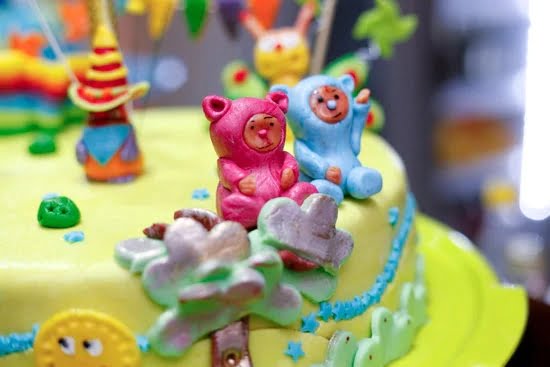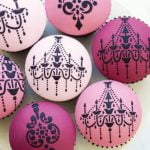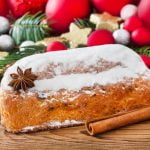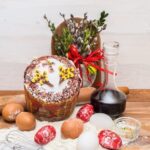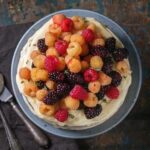Have you ever wondered how to decorate a roll cake to make it not only delicious but also visually appealing? A roll cake, also known as a Swiss roll or jelly roll, is a type of sponge cake filled with cream, frosting, or jam and then rolled into a cylindrical shape.
This versatile dessert is popular for its light and airy texture, making it an ideal canvas for creative decorations. Whether you’re making a roll cake for a special occasion or simply want to elevate your dessert game, learning how to decorate a roll cake can be both fun and rewarding.
Roll cakes have become a popular choice for dessert lovers due to their stunning presentation and customizable nature. They are often featured at celebratory events such as birthdays, weddings, and holidays because they can be decorated to suit any theme or color scheme. The soft and delicate texture of the cake pairs perfectly with various fillings and decorations, offering endless possibilities for flavor combinations and design ideas.
In this article, we will guide you through the process of decorating a roll cake from start to finish. From essential ingredients and tools to step-by-step recipes and decorating techniques, we’ll provide you with all the information you need to create beautiful and delicious roll cakes that will impress your family and friends.
Whether you’re a beginner baker or an experienced pastry chef looking for new inspiration, mastering the art of decorating roll cakes will open up a world of creativity in the kitchen.
Ingredients and Tools
Roll cake is a beloved dessert that is not only delicious but also visually appealing. To create a stunning and eye-catching roll cake, you will need to have the right ingredients and tools on hand. This section will provide a detailed overview of the essential components required for making and decorating a roll cake.
When it comes to making the perfect roll cake, the key ingredients include flour, sugar, eggs, flavorings (such as vanilla extract or cocoa powder), and baking powder. Additionally, you will need filling and frosting ingredients of your choice, such as whipped cream, buttercream, jam, or ganache. As for tools, you will need a jelly roll pan, parchment paper, a hand or stand mixer, mixing bowls, and a sharp knife for trimming the edges of the cake.
Now that you have gathered all the necessary ingredients and tools for making a roll cake from scratch, it’s time to focus on how to decorate it. Decorating techniques can include piping frosting onto the cake using various tips and nozzles to create intricate designs. You can also use edible decorations such as fresh fruit slices, chocolate shavings, sprinkles, or edible flowers to enhance the visual appeal of your roll cake.
In addition to these basic decorating techniques and ingredients, one can explore more advanced methods such as creating an ombre effect with frosting or incorporating decorative stencils for a professional finish. Experimenting with different colors and textures can elevate the overall look of your roll cake and make it truly stand out.
Whether you are preparing a roll cake for a special occasion or simply for indulging in some self-care baking at home, having a well-stocked pantry of essential ingredients and tools will ensure that you are fully equipped to create not just any roll cake but an exceptional one.
| Ingredients | Tools |
|---|---|
| Flour | Jelly Roll Pan |
| Sugar | Parchment Paper |
| Eggs | Mixing Bowls |
Step-by-Step Recipe
To decorate a roll cake, it’s essential to start with a well-made and properly baked base. This means following a reliable recipe for the cake itself and ensuring that it bakes evenly and without cracking. Once the roll cake is baked and cooled, it’s time to move on to the decorating stage. Here’s how you can decorate a roll cake like a pro:
Preparing the Cake
Before diving into decorating, it’s important to prepare the roll cake properly. Carefully unroll the cooled cake, then spread a layer of filling – such as whipped cream, frosting, or fruit preserves – evenly over the surface. Be sure not to overfill, as this can cause the cake to crack when re-rolled.
Frosting and Piping
One popular way to decorate a roll cake is by using frosting and piping techniques. After rolling up the filled cake, cover it with a layer of frosting using an offset spatula – which will help create smooth and even coverage. Then, use a piping bag fitted with your desired tip to pipe decorative borders or designs onto the surface of the cake.
Edible Decorations
Another creative option for decorating a roll cake is to incorporate edible decorations such as fresh fruit slices, chocolate shavings, or edible flowers. These decorations not only add visual appeal but also provide complementary flavors and textures to the finished dessert.
By following these simple yet effective decorating techniques, you can transform a plain roll cake into an eye-catching and delicious centerpiece for any occasion. Whether it’s a birthday celebration, holiday gathering, or simply an afternoon treat, decorating a roll cake allows for endless possibilities in terms of design and presentation. With these tips in mind, anyone can learn how to decorate a roll cake with style and confidence.
Decorating Techniques
Decorating a roll cake is an art that allows for creativity and personal expression. There are several techniques to decorate a roll cake, including piping, frosting, and using edible decorations to add color, texture, and flavor to the dessert. Below are some valuable tips and techniques on how to decorate a roll cake like a pro.
When it comes to decorating a roll cake, piping is an essential skill that allows you to create intricate designs and patterns on the surface of the cake. Using a piping bag with different nozzles, you can create elegant swirls, flowers, or intricate lace designs. It’s important to practice consistency in pressure and movement when piping to achieve clean and professional-looking decorations.
Frosting is another popular technique for decorating roll cakes. Whether using buttercream, cream cheese frosting, or whipped cream, the key is to achieve the right consistency for spreading or piping onto the cake. Smooth out the frosting with an offset spatula for a sleek finish or use textured patterns for added visual interest.
Edible decorations such as fresh fruit, chocolate shavings, sprinkles, or edible flowers can elevate the look of a roll cake while adding delightful flavors and textures. These decorations can be strategically placed on top of the cake or used as accents around the edges for a visually stunning presentation.
| Technique | Description |
|---|---|
| Piping | Using a piping bag with different nozzles to create intricate designs on the cake surface. |
| Frosting | Applying buttercream, cream cheese frosting or whipped cream by spreading it smoothly with an offset spatula or creating textured patterns. |
| Edible Decorations | Utilizing fresh fruit,chocolate shavings,sprinkles or edible flowers to add visuals and flavor. |
Design Inspiration
When it comes to decorating a roll cake for special occasions, the options are truly endless. From simple yet elegant designs for weddings to vibrant and playful creations for birthdays, there is a roll cake design to suit every celebration. Here are some design inspirations to help you take your roll cake decorating skills to the next level:
- For birthdays: Consider incorporating colorful sprinkles, edible glitter, or whimsical fondant shapes on top of the roll cake to create a festive and fun look. You can also use vibrant frosting in different piping patterns to spell out the birthday person’s name or age.
- For holidays: Embrace the spirit of the holiday by decorating your roll cake with themed elements. For example, for Christmas, opt for red and green frosting with peppermint candy accents. For Halloween, use black and orange frosting with spooky decorations like candy eyes or gummy worms.
- For weddings: Keep the design classic and elegant with delicate floral decorations made from buttercream or fondant. Incorporate a neutral color palette of whites, blush pinks, or pastel hues for a timeless appeal. You can also add a touch of glamor with edible pearls or gold leaf accents.
With these design inspirations in mind, you can elevate your roll cake decorating game and impress your guests with stunning creations that capture the essence of any special occasion.
Remember that when it comes to decorating a roll cake for various occasions like birthdays, holidays, or weddings, it’s essential to consider the theme and colors associated with each event. By incorporating unique design elements that reflect the spirit of the occasion while showcasing your creativity and skill in decoration.
Tips for Success
Decorating a roll cake can seem intimidating, but with the right tips and techniques, you can achieve professional-looking decorations that will impress your friends and family. Whether you’re a beginner or an experienced baker, there are several expert tips that can help elevate your roll cake decorating skills.
One important tip for success when decorating a roll cake is to ensure that the cake itself is completely cooled before starting the decoration process. If the cake is still warm, the frosting or filling may melt, resulting in a messy and unattractive finish. Additionally, it’s essential to use a smooth and even layer of filling on the cake before rolling it to create a seamless look once the decorations are added.
When it comes to choosing the right decorating tools for your roll cake, investing in high-quality piping bags and tips can make a significant difference in achieving professional results. These tools allow for precise and controlled piping of frosting or icing onto the cake, giving you greater flexibility in creating intricate designs and patterns.
Furthermore, mastering different frosting techniques such as rosettes, swirls, and ruffles can take your roll cake decorations to the next level. Practice these techniques on a separate surface before applying them to your roll cake to build confidence and precision. By perfecting these skills and incorporating them into your decorating repertoire, you can create visually stunning roll cakes for any occasion with ease.
With these expert tips in mind, you’ll be well-equipped to decorate a roll cake like a pro. Practice makes perfect, so don’t be afraid to experiment with different designs and techniques until you find what works best for you. With patience and creativity, you’ll soon be able to adorn your roll cakes with professional-looking decorations that will leave everyone impressed.
Common Mistakes to Avoid
Decorating a roll cake can be a fun and creative process, but it’s important to be aware of common mistakes that can affect the final result. By understanding these potential pitfalls and how to avoid them, you can ensure that your roll cake decorations turn out flawlessly.
Here are some common decorating mistakes to avoid when decorating a roll cake:
1. Uneven frosting: One of the most common mistakes when decorating a roll cake is uneven frosting. This can result in an unattractive appearance and affect the overall taste and texture of the cake. To avoid this, make sure to spread the frosting evenly across the entire surface of the cake using a spatula or offset spatula.
2. Cracked cake: Another issue that frequently arises when decorating a roll cake is a cracked surface. This can happen due to overbaking or improper rolling technique. To prevent this, be sure to roll the cake gently and evenly while it’s still warm to avoid cracks. Additionally, do not overbake the cake, as this can cause it to dry out and crack during rolling.
3. Color bleeding: When using colorful decorations such as sprinkles or edible flowers on a roll cake, it’s important to be mindful of color bleeding. This occurs when the colors from the decorations seep into the frosting, creating a messy appearance. To prevent color bleeding, consider freezing the decorations before adding them to the cake or lightly dusting them with powdered sugar before placing them on top.
By being aware of these common decorating mistakes and following these tips for avoiding them, you can create a beautifully decorated roll cake that will impress your family and friends.
Troubleshooting
Decorating a roll cake can be a fun and rewarding experience, but it’s not without its challenges. In this section, we will address some common decorating issues that may arise when decorating a roll cake and provide solutions to help you troubleshoot and overcome these obstacles.
Cake Cracks
One of the most common issues when decorating a roll cake is dealing with cracks in the cake. This can happen for several reasons, including overbaking, rolling the cake too tightly, or not using enough powdered sugar when rolling the cake. To prevent cracks, be sure to follow the recipe’s baking time precisely and avoid overbaking.
When rolling the cake, use a light touch and don’t press too hard. Dusting the kitchen towel with a generous amount of powdered sugar before rolling the cake can also help prevent sticking and cracking.
Lumpy Frosting
Another common issue when decorating a roll cake is ending up with lumpy frosting, which can ruin the smooth finish of your design. To avoid lumpy frosting, make sure your butter or cream cheese is at room temperature before mixing it with confectioner’s sugar. If lumps still persist even after thorough mixing, you can strain the frosting through a fine-mesh sieve to remove any remaining lumps.
Uneven Decoration
Achieving an evenly decorated roll cake can be challenging, especially when working with intricate designs or piping techniques. To ensure an even decoration on your roll cake, take your time and work slowly. Using guides such as stencils or templates can help maintain symmetry in your design. Additionally, practicing different piping techniques on parchment paper beforehand can improve precision and control when applying decorations to the actual roll cake.
By addressing these common decorating issues and following our troubleshooting tips, you’ll be better prepared to handle any challenges that may arise when decorating a roll cake. With patience and practice, you’ll soon master the art of creating beautifully decorated roll cakes that are sure to impress friends and family alike.
Conclusion
In conclusion, decorating a roll cake is an enjoyable and creative process that allows for endless possibilities. With the right ingredients, tools, and techniques, anyone can create a stunning and delicious roll cake that is sure to impress. From simple designs to more elaborate creations, there are countless ways to decorate a roll cake for various occasions.
By following the step-by-step recipe and exploring different decorating techniques, such as piping, frosting, and using edible decorations, individuals can unleash their creativity and personalize their roll cakes according to their preferences. Whether it’s a birthday celebration, holiday gathering, or wedding reception, a beautifully decorated roll cake can serve as the perfect centerpiece dessert.
Ultimately, the key to successful roll cake decoration lies in practice, patience, and attention to detail. By utilizing the tips for success and being mindful of common mistakes to avoid, aspiring bakers can elevate their decorating skills and achieve professional-looking results.
With a bit of creativity and the willingness to experiment with different designs and flavors, anyone can master the art of decorating a roll cake. So go ahead and try your hand at decorating a roll cake with confidence – the possibilities are endless.
Frequently Asked Questions
How Do You Flip a Cake for a Cake Roll?
To flip a cake for a cake roll, place a clean kitchen towel on the counter and sprinkle it with powdered sugar. Then, carefully invert the cake onto the towel and peel off the parchment paper.
Why Does My Swiss Roll Crack When I Roll It?
A Swiss roll may crack when rolled due to overbaking or not rolling it while it’s still hot. To prevent cracking, make sure to roll the cake immediately after removing it from the oven and use a light touch.
How Do You Put Patterns on a Cake?
Putting patterns on a cake can be achieved using various techniques such as stenciling, piping with icing, or using decorative molds. Stenciling involves placing a design over the cake and then dusting with powdered sugar or cocoa. Piping uses icing to create intricate designs, while decorative molds can impress patterns into fondant or other pliable toppings.

Welcome to our cake decorating blog! My name is Destiny Flores, and I am the proud owner of a cake decorating business named Cake Karma. Our mission is to provide delicious, beautiful cakes for all occasions. We specialize in creating custom cakes that are tailored specifically to each customer’s individual needs and tastes.

